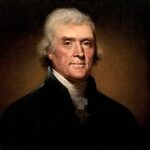The Historic Decision
In 1803, President Thomas Jefferson faced a crucial decision regarding American expansion. Napoleon Bonaparte offered to sell the entire Louisiana Territory to the United States. The Louisiana Purchase encompassed 828,000 square miles stretching from the Mississippi River to the Rocky Mountains. Jefferson initially sought only New Orleans and West Florida for $10 million. 💰 Instead, France offered the entire territory for just $15 million, or roughly 4 cents per acre.
Constitutional Concerns and Quick Action
Jefferson wrestled with constitutional doubts about federal land acquisition powers. The Constitution did not explicitly grant such authority to the federal government. However, Jefferson prioritized national interests over strict constitutional interpretation. 📊 The deal required swift action before Napoleon changed his mind. Jefferson’s envoys Robert Livingston and James Monroe negotiated the final terms in Paris. The purchase officially transferred on December 20, 1803.
Strategic Importance
The Louisiana Purchase secured vital Mississippi River access for American commerce. Western farmers depended on the river to transport goods to international markets. ⚠️ French control posed significant economic threats to American prosperity. The acquisition eliminated potential conflicts with European powers over territorial disputes.
Impact:
Immediate National Transformation
The Louisiana Purchase instantly doubled America’s territorial size and population capacity. 🌍 The acquisition included future states of Louisiana, Missouri, Arkansas, Iowa, Minnesota, North Dakota, South Dakota, Nebraska, and Oklahoma. Parts of Colorado, Kansas, Montana, New Mexico, and Wyoming also joined the union. The purchase cost approximately $15 million, equivalent to $340 million today. This represented one of history’s most successful real estate transactions.
Economic and Political Consequences
Westward expansion accelerated dramatically following the Louisiana Purchase. 💰 New agricultural opportunities emerged across vast fertile plains and river valleys. The acquisition strengthened America’s position in international trade negotiations. Control of New Orleans became crucial for American economic independence. However, the purchase intensified debates over slavery’s expansion into new territories.
Long-term Historical Significance
The Louisiana Purchase established America as a continental power with transcontinental ambitions. 🔥 The decision sparked the concept of Manifest Destiny and justified further territorial expansion. The acquisition provided resources and space for millions of future immigrants. Jefferson’s bold decision demonstrated federal government flexibility in interpreting constitutional powers. The purchase ultimately enabled America’s transformation from a coastal nation into a continental empire, shaping the country’s destiny for generations.
